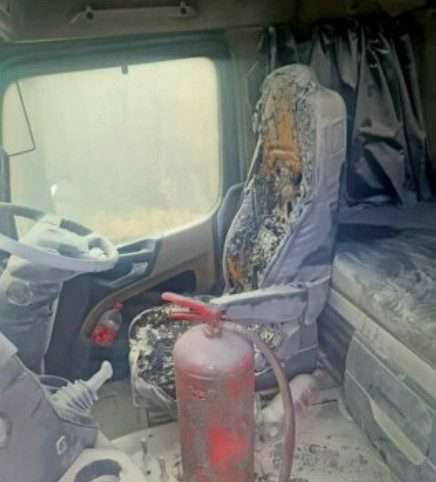Police in Mpumalanga say they cannot ascertain whether the woman who nearly burned to death inside a truck that was set alight along the N2 toll road between Piet Retief and Ermelo was a sex worker.
According to provincial police spokesperson Brig Selvy Mohlala, the victim (sex worker) was allegedly sleeping in one of the four trucks that were attacked in the area this week.
“It is alleged that people emerged from the grass and approached the trucks with firearms and instructed the drivers to get out or they would burn them alive inside.
“Three people were seriously burned while one only burned in the cabin. One passenger, a lady(sex worker), sustained burn wounds on her feet as she was allegedly sleeping in one of the trucks. She was taken for medical help by the emergency medical services vehicle,” said Mohlala.
However, when asked if it made sense that there could be a female(sex worker) passenger sleeping in a truck cabin when trucking companies forbid their drivers from offering rides to hitch-hikers, Mohlala said they could not ascertain the status of the female victim.“We are not sure of that,” he said.
The safety of sex workers has been a matter of concern in South Africa.
In December last year, the National Assembly passed a bill aimed at amending laws that criminalise sex work and leave women at the mercy of pimps and drug lords.
In a rebuttal of media reports, second deputy secretary-general of the ANC Maropene Ramokgopa wrote that the party believed decriminalisation of sex work was a better step towards the protection of women who ply their trade in the industry.
“A report titled Equal Rights, Human Rights – Protecting the rights of sex workers: Evidence on human rights violations, 2022, was released in December last year by a number of regional institutions. It states clearly that sex workers deserve equal protection of their human rights under the law as society as a whole. And yet, studies show that sex workers continually have their human rights violated. The ongoing criminalisation of sex work further contributes to gender-based
violence and femicide as it leaves sex workers unprotected by the law, unable to exercise their rights as citizens and open to abuse generally.”
According to a study conducted on truck drivers and sex workers between South Africa and Swaziland, the National Centre for Biotechnology Information, the stigma around sex worker trade on the road has increased HIV infections, putting both parties at high risk.
“This study was conducted along the N3, a major highway between Johannesburg and Durban. The nature of the sex trade along the highway continues to be risky despite the availability of HIV testing and antiretroviral treatment. The sex trade is perceived to be increasing along trucking routes, in spite of measures instituted to limit access to sex workers.
“Female sex workers struggle to cope with the pressure of unprotected sex because of the need to generate more income, as well as avoid incidents of violence and threats,” stated the study.
The recent spate of violent attacks on trucks and their occupants in provinces such as KwaZulu-Natal, Mpumalanga and Limpopo has evoked painful memories of the 2021 July unrest that resulted in more than 300 deaths and a loss of R50-billion to the economy.
During a media briefing held this week, Police Minister Bheki Cele intimated that the attacks seemed coordinated.
“Intelligence suggests that attacks on trucks may be business related. Evidence before us points to an organised, coordinated and sophisticated operation that seeks to undermine and sabotage the state and businesses,” said Cele.
He conceded that the attacks that happened in Limpopo could be linked to service delivery issues but said he was sure that those in KZN and Mpumalanga were part of organised crime.
South African truck drivers under the umbrella of the All Truck Drivers Foundation (ATDF) have blamed the government for the ongoing arson attacks on trucks.
ATDF secretary Sifiso Nyathi said while their organisation was against the recent attacks, genuine issues should not be swept under the carpet.
“If you speak of ATDF, we have been raising concerns about the struggles of truck drivers since 2018..
“The trucking sector is not one you can define as requiring scarce skills, but there is a domination of foreign people whose employment does not comply with the regulations.
“There are fly-by-night companies that take advantage of the industry and we have raised these issues with various ministers but there is no implementation to the solutions proposed,” said Nyathi.
Follow @SundayWorldZA on Twitter and @sundayworldza on Instagram, or like our Facebook Page, Sunday World, by clicking here for the latest breaking news in South Africa.



